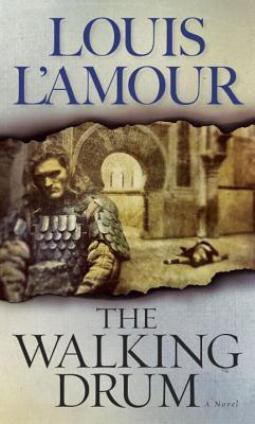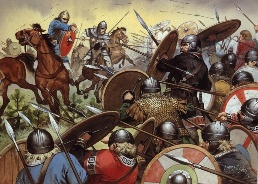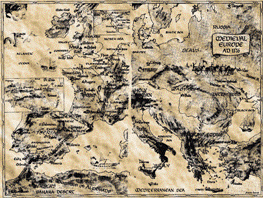Writerly Lessons from Louis L’Amour’s The Walking Drum

I read Louis L’Amour’s medieval adventure novel The Walking Drum so you don’t have to (link).
A thorough edit would fix the expository intrusions (L’Amour keeps taking out his research and waving it around). However, this would not have fixed the structural problem (there was no structure).
Even so, this literary failure is still a heroic one. The book not only displays the craft of a veteran adventure writer, it is also an object lesson in career strategy.
As an author I benefited from reading this book. Let me tell you why…
First, this book can teach us some craft. It confirms the idea that research can be layered (link). There’s a lot you don’t need to know when writing a Historical story and a lot you can put in on the final draft.

However, what makes The Walking Drum truly illuminating is that it is like sitting Louis L’Amour down with beer and getting him to brainstorm historical adventure plots until we can see how he does it.
L’Amour clearly focuses on conflicts leading to physical threats. I’m a great enthusiast for exploring story worlds through conflict (link). However, L’Amour reveals a shortcut: Identify the people who are a physical threat to your character and find the conflicts that link them. I suppose L’Amour would say:
Have your hero fall out with the men with guns.
He’s got a good approach to involving his serial protagonist — because that’s what Mathurin really is — in local difficulties. Except in the lame beekeeper (as in “it sucked” rather than that the beekeeper had any disability) sequence, Mathurin is always either a potential asset and/or through a personality trait, the protector of an actual asset. L’Amour might have put it:
Have people see your hero as a gun for hire, or else make him protect somebody.

And, of course, we see the same at work in other tales of wanderers, including Conan and Dumarest.
Second, and less comfortable, this book is an object lesson about career strategy.
Much as he must have enjoyed writing Westerns, Louis L’Amour obviously really, really loved this era. His enthusiasm shines from every page. The research he flaunts — that’s obviously just the tip of the iceberg. It feels as if he spent most of his life preparing to write this book. And yet, out of more than a hundred works, The Walking Drum is his only medieval story. Worse, it came out when he was eighty (80!), just four years short of his death, and he blew it.
I was there at Brighton World Fantasy 2013 when Neil Gaiman declared:
Make the art that only you can make, write whatever the #### you want, there are no rules

I still don’t entirely believe him.
There may not be rules, but there are rules-of-the-thumb akin to physical laws and these define the environment in which we write: what works and does not work with readers, who reads what and where they buy it.
Perhaps your innovative work will change the way people consume books. Then again, there’s a reason why we call the “bleeding edge” the “bleeding edge.” One (proverbial) lemming sipping Red Stripe on a Jamaican beach doesn’t validate lemming migration strategy.
Even so, I’m sitting here at my desk looking up at my wall of Ancient and Medieval research books and wondering: What should I write next?
M Harold Page is the sword-wielding author of books like Swords vs Tanks (Charles Stross: “Holy ****!”) and has an academic background in Medieval History. For his take on writing, try Storyteller Tools: Outline from vision to finished novel without losing the magic.
I didn’t know Louis L’amour had ever written anything other than westerns!
L’Amour wrote boxing stories, spy stories, seafaring stories…
[…] DRUM LESSONS. M. Harold Page finds “Writerly Lessons from Louis L’Amour’s The Walking Drum” at Black […]
I loved the book !